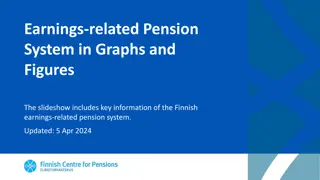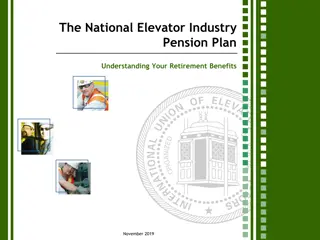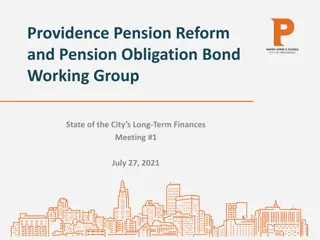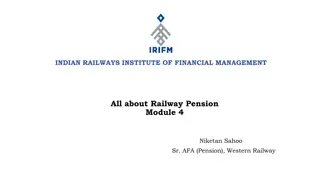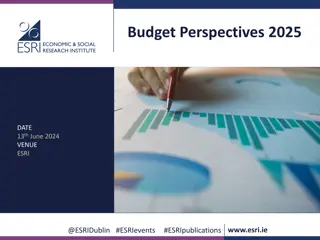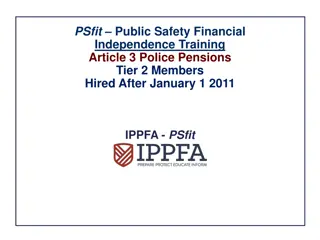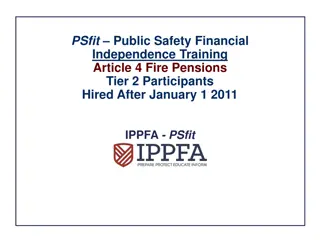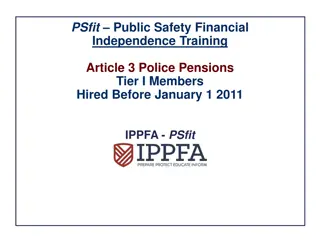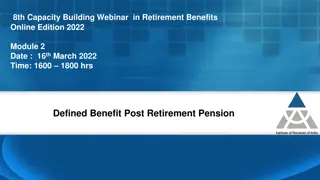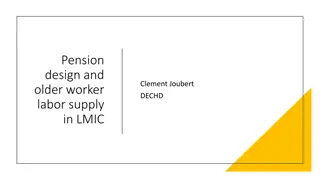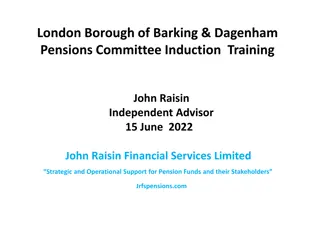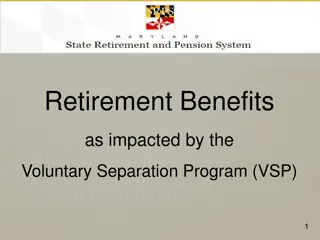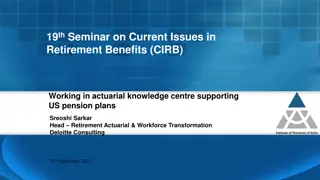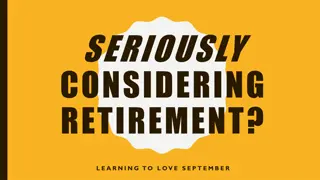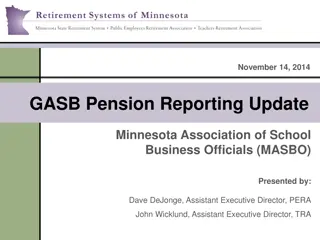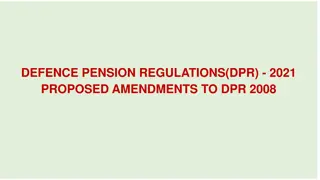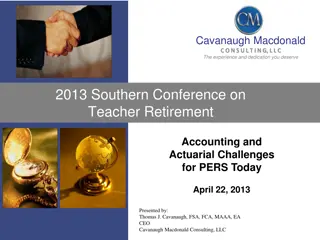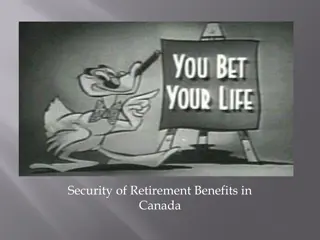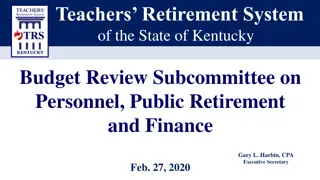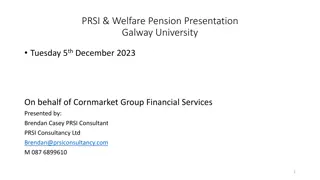A Comprehensive Guide to Welfare Benefits and State Pension
Understanding different types of welfare benefits such as contributory, non-contributory, and means-tested benefits is crucial for individuals navigating the welfare system. This guide covers a range of benefits including State Pension, Pension Credit, Universal Credit, and more, providing valuable insights on eligibility criteria, age requirements, and the changing landscape of benefit entitlements. It emphasizes the importance of seeking further advice before making any decisions related to benefits.
Download Presentation

Please find below an Image/Link to download the presentation.
The content on the website is provided AS IS for your information and personal use only. It may not be sold, licensed, or shared on other websites without obtaining consent from the author. Download presentation by click this link. If you encounter any issues during the download, it is possible that the publisher has removed the file from their server.
E N D
Presentation Transcript
Welfare Benefits Where do I start? NB This information is correct at the date of printing (26thJanuary 2017)- it should be used only as a guide and it is recommended that further advice and assistance is sought before taking any action
There are three main types of benefits Contributory Non-contributory Earnings replacement benefits Dependent on National Insurance contributions you have made, been credited with, in relevant period Or in some cases, on NI contributions, credits of your partner Non- means tested Occasionally other income from you or your partner can affect how much you get Eg contribution based Universal Credit, State Retirement Pension, Bereavement Benefits Dependent on circumstances/ earning replacement Doesn t matter about NI contributions Non-means tested Can get at the same time as some contributory or means tested benefits Eg. Child Benefit, Personal Independence Payment, Disability Living Allowance, Attendance Allowance, Carer s Allowance, Industrial Injuries benefits, Guardian s allowance
Means Tested Benefits- designed as a safety net so that no-ones income should normally fall below a minimum level set by the government Pension Credit Payable to people over the state pension age for women This is currently about 63 but depends on your date of birth If one of a couple is under PC age they have to claim Universal Credit not PC Social Fund, Benefit Advances, Local Assistance fund Some benefits fall between contributory and non-contributory. We can think of these as employment related benefits eg Statutory Sick Pay, Maternity Allowance Council Tax Reduction In England each council can set its own rules Universal Credit UC is replacing most means tested benefits It includes housing costs It is paid monthly
State Pension State Pension age is the age when people can choose to start getting their State Pension. State Pension age used to be 60 for a woman and 65 for a man. However, State Pension age is changing for most people. If you are a woman born on or after 6 April 1950, you will no longer be able to claim a State Pension at the age of 60 and if you are a man born on or after 6 December 1953 you will no longer be able to claim a State Pension at the age of 65. If you fall into one of these groups of men or women, the age when you can claim your State Pension depends on your date of birth. Along with the changes in State Pension age, there are changes to the age when you become entitled to some other benefits. If you are already getting benefits and you are approaching pension age you might need to consult an experienced adviser about how the different benefits work together. If you have a choice between different benefits, an experienced adviser can help you choose which is best for you. You can find out your exact State Pension age by using the calculator on the GOV.UK website
State Pension Age State Pension age for women If you were born before 6 April 1950, your State Pension age is 60. If you were born on or after 6 April 1950 but before 6 December 1953, your State Pension age will be somewhere between 60 and 65, depending on your date of birth. If you were born on or after 6 December 1953 but before 6 April 1978, your State Pension age will be somewhere between 65 and 68 depending on your date of birth. If you were born on or after 6 April 1978, your State Pension age will be 68. State Pension age for men If you were born before 6 December 1953, your State Pension age is 65. If you were born on or after 6 December 1953 but before 6 April 1978, your State Pension age will be somewhere between 65 and 68 depending on your date of birth.
Disability Benefits are not means tested so it doesn't matter what other money you get. It doesn't matter how much you have in savings either - there's no limit. Personal Independence Payment- can be claimed if you : are aged 16 to 64 need help with everyday tasks or getting around have needed this help for 3 months and expect it to need it for another 9 months usually be living in England, Wales or Scotland when you apply have lived in England, Wales or Scotland for at least 2 years Attendance Allowance- you will need: to be 65 or over to claim to have a disability or illness that makes it hard for you to look after yourself (for 3 months & expect to continue with the needs for 9 months) You could get 55.10 or 82.30 a week - the amount you get will depend on how much help you need. It won't affect your state pension and you can claim it if you're still working and earning money. There are exceptions to these rules if you re terminally ill or in the armed forces.
Disability benefits for children Disability Living Allowance is for children Who need more care, attention or supervision than a child of the same age who isn't disabled, or Who have difficulty walking or getting around outdoors in unfamiliar places Who needs to be under 16 for you to claim DLA - if they're 16 or over you'll have to claim Personal Independence Payment Other Help if you look after children If you have responsibility for children, you may be able to claim Child Benefit for the children, and, depending on your income, Child Tax Credit.
Carers Allowance You must not earn more than 110 a week after deductions such as tax and national insurance You need to be in Great Britain when you claim - there are some exceptions, for example, for members and family members of the Armed Forces-and have been in Great Britain for at least 2 of the last 3 years you are habitually resident in the UK, Ireland, Isle of Man or the Channel Islands you are not subject to immigration control that would stop you getting benefit A non contributory benefit (you do not have to have paid National Insurance) for people who are giving regular and substantial care to disabled people who do not live in care. It forms part of your taxable income. You must be aged 16 or over and not in full time education You must spend at least 35 hours a week caring for disabled person who gets one of the following benefits: Attendance Allowance, Constant Attendance Allowance, the middle or higher rate for personal care of Disability Living Allowance, the daily living component of Personal Independence Payment (either rate) or Armed Forces Independence Payment
Other help available Help if you are widowed If your husband, wife or civil partner has died, you cannot get a weekly Bereavement Benefit once you have reached State Pension age. However, you may be able to get extra State Pension based on the national insurance contributions of your late spouse or civil partner or a lump sum one-off payment. Bereavement benefits before State Pension age include: Bereavement Payment - a one-off lump sum you claim when your spouse or civil partner dies Widowed Parent s Allowance if you have dependent children Bereavement Allowance if you don't have dependent children Bereavement benefits are paid to widows, widowers or the surviving partner of a civil partnership. You can get a bereavement benefit if your husband, wife or civil partner died on or after 9 April 2001. If you are a man whose wife died before this date, you may still be able to get some benefit if you have children If you are a woman and your husband died before this date, you may be getting Widow s Pension or Widowed Mother s Allowance. You can carry on getting these benefits for as long as you are entitled
Travel concessions, , prescriptions and other health costs, Winter fuel payment If you live in England, you can get free prescriptions from the age of 60. You can get help with other costs such as dental charges and travel to appointments if you are on Pension Credit guarantee credit You can also get help on the low income scheme 0300 330 1343 If you're older, you may be entitled to a Winter Fuel Payment. If you're a woman, you can get a Winter Fuel Payment once you've reached State Pension age. If you're a man, you can get a Winter Fuel Payment once you've reached the State Pension age of a woman born on the same day as you. If you're a woman living in England, you can get free bus travel once you've reached State Pension age. If you're a man living in England, you can get free bus travel once you've reached the State Pension age of a woman born on the same day as you. You may also get travel concessions on other sorts of public transport.
Pension Wise- 0800 138 3944 You can book a free Pension Wise appointment An appointment is a conversation with a pension specialist. You ll talk about the options you have for taking your pension money. Your appointment will last around 45 to 60 minutes and we will: explain your pension options explain how each option is taxed give you next steps to take You can speak to us over the phone or face to face somewhere local to you.
Pension wise can help: Find out your pension type Check how much is in your pot Pension types Understand your pension statement The State Pension What you can do with your pot Leave your pot untouched Get a guaranteed income (annuity) Get an adjustable income Take cash in chunks Take your whole pot Mix your options Make your money last Transfer your pension Work out what you ll have in retirement Taking your pension before 55 How to avoid a pension scam Shop around and compare provider Editor s note: Right click on a link and choose open hyperlink , to view.


